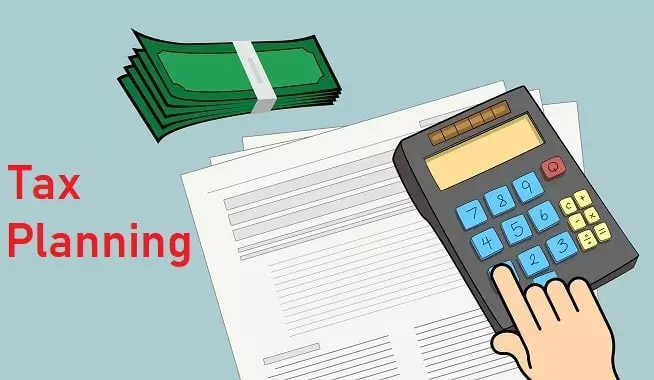When you are earning, you are subjected to income tax. The tax rates are significantly higher for high-income individuals. You don’t pay taxes on the full pay, but you calculate the taxable income to calculate the tax. The taxable income is arrived at after considering deductions and rebates in your income. Once the taxable income is calculated, the taxes can be calculated as per the various tax slabs. As per the tax planning, you go over the possible deductions and try to reduce your taxable income as much as possible. You can find out more in the next section.
🤔 What is a Tax Planning?
Direct taxes or income tax can form a significant portion of the deduction for you. To deal with this, you need to opt for tax planning. Under tax planning, you reduce your tax burden legitimately. To reduce your tax, you use deductions, exemptions and benefits the government offers. This would usually have a significant impact on tax liability. In a way, tax planning is an analysis of the financial situation from the tax efficiency perspective. During the tax planning, you may have to invest in mutual funds, insurance and other saving schemes to get the most out of it. The investments should be planned; hence, tax planning helps you plan all of these investments and expenses that enable you to save tax. Let us now learn more about tax planning by understanding its pros and cons.
👍 Advantages of Tax Planning
In this section, we have covered all the advantages of tax planning.
- Reduced Tax Liability – The primary goal of tax planning is to reduce tax liability, which is also an advantage of tax planning. No one likes to part away with a significant portion of their income, so you need to take steps to reduce your tax liability. The lower the tax liability, the lower the tax deduction at the source.
- Increases Income – Since the tax liability is reduced with the help of tax planning, you have a higher disposable income available. This income certainly helps you create a saving corpus and allows you to spend more. Eventually, this money is going to be available to you. Always remember that money saved is money earned.
- Creates Investment Opportunities – During the tax planning, you will realize that you can take advantage of various saving schemes to save tax. This includes mutual funds, fixed deposits, national pension schemes, endowment plans and much more. So, in a way, tax planning is creating investment opportunities for you. It helps you explore the investment options that would benefit you in the long run.
- Rewards Positive Behaviour – In a way, tax planning is also rewarding positive behavior. Here, positive behaviour includes saving money for the future. The positive behaviour also includes buying a house on loan. In both these ways, you get tax benefits. There are many other ways in which tax planning reinforces positive behavior. The insurance premiums are also tax deductible, so you get benefits there.
- Eliminates Need for Tax Return – If you plan your taxes well in advance, you can reduce your TDS amount. This meant that filing income tax returns would be easier. You would not have to wait for your tax refund at the end of the financial year. This is something that enables people to avoid higher tax deductions.
- Calculators Available – It is easier to complete tax planning with just a little knowledge. Many online calculators available can help you find the best way to reduce the tax. So you will be able to automate things for yourself. Some tools also enable you to invest from a single interface, depending on your tax planning. Moreover, you can save the extract of tax planning and use it straight away during the income tax returns.
👎 Disadvantages of Tax Planning
Let us now check out the disadvantages or limitations of tax planning.
- Fund Gets Blocked – You must invest in certain assets for successful tax planning. Let us take two different examples here. The first asset people will most likely invest in is the tax saving mutual funds. These funds have a lock-in period of 3 years. Similarly, some may prefer investments in fixed deposits. The lock-in period of tax-saving fixed deposits is five years. So, your liquidity will be compromised when you are planning your taxes.
- Needs Knowledge – It doesn’t require much knowledge, but it certainly requires a basic understanding of various sections to complete the tax planning. It should be noted that there is a very thin line between tax evasion and tax planning. You need to know the limits, and you need to know when you are crossing that line.
- Expensive Professional Help – If you don’t have any knowledge of taxation, then you would need professional help for tax planning. In such a case, you may spend as a fee for the tax planning. You can avoid that by learning about tax planning procedures, as professional help will cost you money.
What Are Common Sections Used for Tax Planning?
There are many different sections available under income tax to save the tax. We will list some of the most common ones in this section.
- Section 80C – This includes deduction under mutual funds, provident funds, fixed deposits, national saving certificates and insurance. The cumulative amount under section 80C should not cross Rs 1.5 Lakh annually.
- Section 80D – This section includes the tax deductions for your or your parents’ health insurance. There is a sub-limit on how much you can claim.
- Section 80E – Under this section, you can deduct the interest paid on the education loan. There is no upper cap on this section, so you can use your interest-paid component fully.
- HRA – The house rent you can pay is also tax deductible, so you will be able to save taxes on the rent paid. You would need the PAN of your landlord if in case you are paying more than ~Rs 8333 per month.
- Section 24 – The interest paid on a home loan can be deducted in this section. There are certain conditions under this section, and you can review them for more clarity.
Final Verdict
This was all about tax planning. We recommend investing some time in tax planning at the start of the year so that you can have a cascading effect on the TDS. A little knowledge about tax planning and income tax would go a long way.
Tax Planning Frequently Asked Questions
Q1. What Is The Difference Between Tax Planning And Tax Preparation?
Ans: Tax planning is like being a detective. You look at all the pieces of your financial puzzle and try to find ways to save money on your taxes. Tax preparation, on the other hand, is more like putting together a puzzle. You gather all the necessary pieces of information and fit them together to file your taxes accurately.
Q2. Is Tax Planning Only For High-Income Earners Or Can Anyone Benefit From It?
Ans: Tax planning is not just for the wealthy. Anyone can benefit from it! By understanding the tax laws and finding ways to take advantage of them, you can reduce the amount of taxes you owe and keep more of your hard-earned money.
Q3. How Do Capital Gains And Losses Affect My Tax Liability?
Ans: Capital gains and losses can affect how much you owe in taxes. If you sell something for more than you paid for it, that’s a capital gain. If you sell something for less than you paid for it, that’s a capital loss. Depending on whether you have more gains or losses, you may owe more or less in taxes.
Q4. Can I Use Capital Gains And Losses To My Advantage?
Ans: Well, by selling investments at a loss, you can reduce your taxable income and lower your tax bill. You can also hold onto investments for more than a year to take advantage of lower long-term capital gains rates.
Q5. How Can I Ensure That I Am Not Breaking Any Tax Laws While Planning For Taxes?
Ans: To make sure you’re following the tax laws while planning for taxes, it’s a good idea to talk to a tax professional. They can help you understand the complex tax code and make sure you’re taking advantage of all the deductions and credits available to you without breaking any laws.
Related Topics
- Indirect Tax Advantages and Disadvantages
- Value Added Tax Advantages and Disadvantages
- Income Tax Return Filing Advantages and Disadvantages
















I’m delighted you mentioned that tax planning can help lower tax liabilities. Last year’s tax season left my cousin feeling a little overwhelmed so she has been looking for services that would be beneficial for her this year. After reading your post, I believe that she might benefit from using tax planning services. I’ll make sure to let her know about this and look up experts who might be able to assist her.